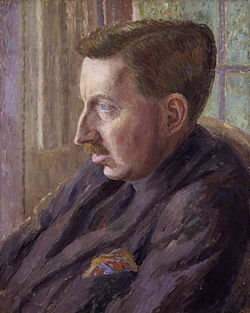E.M. Forster Quote
You only care about the things that you can use, and therefore arrange them in the following order: Money, supremely useful; intellect, rather useful; imagination, of no use at all. No—for the other had protested—your Pan-Germanism is no more imaginative than is our Imperialism over here. It is the vice of a vulgar mind to be thrilled by bigness, to think that a thousand square miles are a thousand times more wonderful than one square mile, and that a million square miles are almost the same as heaven. That is not imagination. No, it kills it. When their poets over here try to celebrate bigness they are dead at once, and naturally. Your poets too are dying, your philosophers, your musicians, to whom Europe has listened for two hundred years. Gone. Gone with the little courts that nurtured them—gone with Esterhaz and Weimar. What? What’s that? Your universities? Oh, yes, you have learned men, who collect more facts than do the learned men of England. They collect facts, and facts, and empires of facts. But which of them will rekindle the light within?
You only care about the things that you can use, and therefore arrange them in the following order: Money, supremely useful; intellect, rather useful; imagination, of no use at all. No—for the other had protested—your Pan-Germanism is no more imaginative than is our Imperialism over here. It is the vice of a vulgar mind to be thrilled by bigness, to think that a thousand square miles are a thousand times more wonderful than one square mile, and that a million square miles are almost the same as heaven. That is not imagination. No, it kills it. When their poets over here try to celebrate bigness they are dead at once, and naturally. Your poets too are dying, your philosophers, your musicians, to whom Europe has listened for two hundred years. Gone. Gone with the little courts that nurtured them—gone with Esterhaz and Weimar. What? What’s that? Your universities? Oh, yes, you have learned men, who collect more facts than do the learned men of England. They collect facts, and facts, and empires of facts. But which of them will rekindle the light within?
Related Quotes
About E.M. Forster
Considered one of the most successful of the Edwardian era English novelists, he was nominated for the Nobel Prize in Literature in 22 separate years. He declined a knighthood in 1949, though he received the Order of Merit upon his 90th birthday. Forster was made a Member of the Order of the Companions of Honour in 1953, and in 1961 he was one of the first five authors named as a Companion of Literature by the Royal Society of Literature.
After attending Tonbridge School, Forster studied history and classics at King's College, Cambridge, where he met fellow future writers such as Lytton Strachey and Leonard Woolf. He then travelled throughout Europe before publishing his first novel, Where Angels Fear to Tread, in 1905. The last of his novels to be published, Maurice, is a tale of homosexual love in early 20th-century England. While completed in 1914, the novel was not published until 1971, the year after his death.
Many of his novels were posthumously adapted for cinema, including Merchant Ivory Productions of A Room with a View (1985), Maurice (1987) and Howards End (1992), critically acclaimed period dramas which featured lavish sets and esteemed British actors, including Helena Bonham Carter, Daniel Day-Lewis, Hugh Grant, Anthony Hopkins and Emma Thompson. Director David Lean filmed another well-received adaptation, A Passage to India, in 1984.
